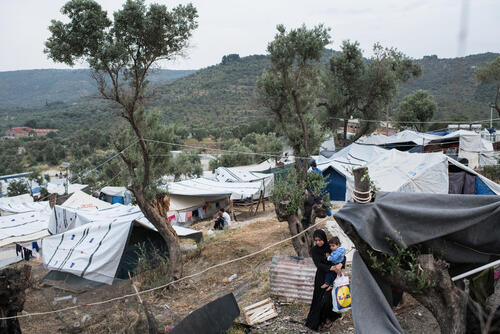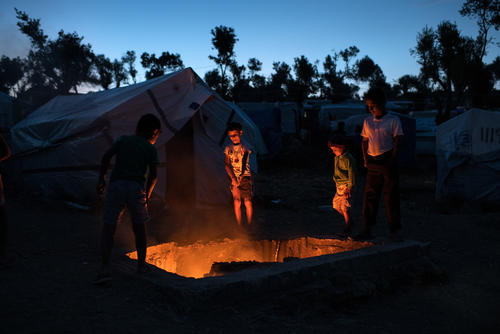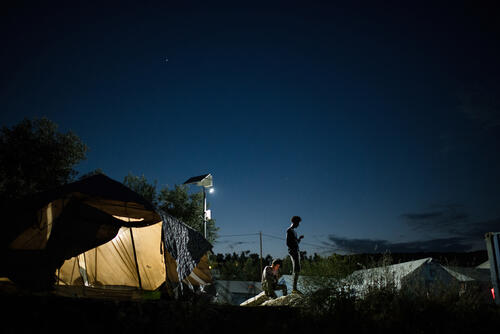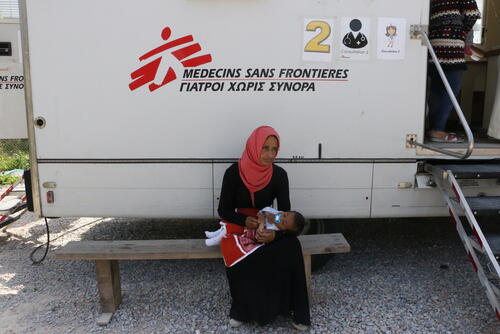An open letter from MSF clinical psychiatrist Dr Alessandro Barberio, Moria camp, Lesbos, Greece
I have worked for 14 years as a clinical psychiatrist in the Mental Health department of Trieste in Italy. I’m considered an expert on psychiatric emergencies and I work with people who have addiction and psychiatric comorbidities. I treat people who have been victims of human trafficking, I provide mental health support for refugees and people in prison, and advise on protection and social recovery programmes. Over the course of my career, I have gained significant clinical and professional experience in difficult contexts and crisis situations.
In all of my years of medical practice, I have never witnessed such overwhelming numbers of people suffering from serious mental health conditions, as I am witnessing now amongst refugees on the island of Lesbos. The vast majority of people I see are presenting with psychotic symptoms, suicidal thoughts – even attempts at suicide – and are confused. Many are unable to meet or perform even their most basic everyday functions, such as sleeping, eating well, maintaining personal hygiene, and communicating.
Moria camp, in Lesbos, has a maximum capacity of 3,100 people, but is bursting at the seams, with over 9,000 people. A third of them are children, living in appalling conditions, which are contributing to a considerable deterioration of their physical and mental health.
I have never witnessed such overwhelming numbers of people suffering from serious mental health conditions, as I am witnessing now amongst refugees on the island of Lesbos.
The asylum seekers include people who have been subjected to extreme forms of torture and violence, both in their countries of origin and during their journey. They have been severely traumatised, both mentally and physically. In their island prison on Lesbos, they are forced to live in a context that promotes frequent violence in all its forms – including sexual and gender-based violence that affects children and adults. This constant violence serves as a recurrent trigger for the development of severe psychiatric symptoms. The increase in the number of arrivals we’re now seeing on the island, in combination with the disproportionately low departure rate to the mainland, is further exacerbating these conditions and contributes to the growing mental health burden of these people.
Each day, the teams of Mytilene and Moria clinics struggle to cover the enormous medical, paediatric and mental health needs. I see my colleagues on the ground becoming exhausted with the burden of the number and severity of these cases, as well as trying to plug the gaps in the system. This is compounded by the fact that every day we see the asylum system breaking, the living conditions rapidly deteriorating, and the failure of the government, EU and the UNHCR to respond to this crisis. That we have a limited ability to substantially change the situation adds to our stress. Meanwhile, there is an ever-increasing influx of new and more severe psychiatric cases, and I don’t believe this is likely to change soon. Indeed, the psychiatric needs of the population will not change as long as the containment policy remains in place
In their island prison on Lesbos, they are forced to live in a context that promotes frequent violence in all its forms – including sexual and gender-based violence that affects children and adults.
While these vulnerable people await the conclusion of their asylum application, it strikes me that the appalling living conditions and the exposure to constant violence, the lack of freedom and rights accorded to migrants, the severe deterioration of health and mental health, and the everyday stress and pressure placed on all inhabitants of the island, has caused Lesbos to resemble an old-fashioned mental asylum, not seen in parts of Europe since the mid-20th century.
Meanwhile, the tension and suffering among the citizens and employees working in local and governmental organisations is increasingly visible. Other NGOs with whom we collaborate are equally distressed and overwhelmed, which often causes them to suspend or reduce their activities, which further exacerbates this desperate situation.
I see my colleagues on the ground becoming exhausted with the burden of the number and severity of these cases, as well as trying to plug the gaps in the system.
Considering the outright violation of human rights and the grave medical and psychiatric needs we face every day, it is clear that Moria camp is in a state of emergency. It would be both unreasonable and unethical not to consider the situation as such and take decisive action immediately. Based on my long clinical experience and the analysis of this difficult context, I firmly believe that the current situation could drastically deteriorate even within the coming weeks, with an escalation of violence that would plunge the island into extreme chaos.






